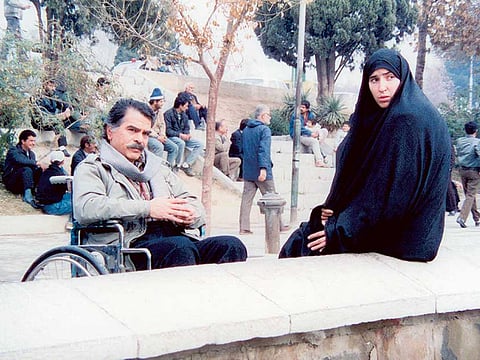Lebanon censors films at international festival
Organisers lament ‘political interference’ in arts and culture as Palestinian, Syrian and Iranian movies censored

Beirut: The Beirut International Film Festival [BIFF], which is holding its 16th edition, has been asked to snip footage from three films before they could be screened, according to news reports.
The censored films are Personal Affairs [Umoor Shakhsiyyah in Arabic] directed by the Palestinian filmmaker Maha Haj, World Cup [Ka’s Al ‘Alam] directed by two Syrian brothers, Mohammed and Ahmad Malas, and The Nights of Zayandeh-Rood directed by the famed Iranian artist Mohsen Makhmalbaf. The film festival opened on October 5 and will conclude on October 13.
According to Colette Naufal, Lebanon’s General Security agency demanded that a specific scene be deleted from World Cup, allegedly because it was deemed to contain insults to Lebanese personalities and parties. Tareq Halabi, the head of the audiovisual department at General Security, insisted that the movie was not banned but that certain scenes must be removed before it could be screened in public, which festival organisers refused.
“It is unfortunate that political considerations interfere in arts and culture,” declared Naufal, the BIFF Director, adding that the cinematic event aimed to present “a platform for freedom of expression” that the overwhelming majority of Lebanese stand for.
Halabi disagreed and insisted that screening the Palestinian director’s film went against a boycott of all Israeli products in Lebanon, “whether artistic or not”, presumably because it was produced by an Israeli company and shot in Israel. Personal Affairs was shown at the prestigious Cannes Film Festival earlier this year and was very well received by the public even if it did not win a prize.
In the event, Halabi’s troubling commentaries were not limited to that matter, as he concluded that The Nights of Zayandeh-Rood, which apparently “showed certain elements concerning Iran”, contravened Lebanese law. In his own words: “Lebanese laws forbid meddling in Iranian affairs”, which spoke volumes, especially since the movie is not a Lebanese production, was not filmed in the country, and is the product of an award-winning Iranian director.
Makhmalbaf made more than 20 feature films and won some 50 awards including the globally acclaimed Kandahar [Safar-e Ghandehar, or Journey to Kandahar], which won the Federico Fellini Prize from Unesco in 2001. He served as a member of the Jury at the prestigious Venice Film Festival in 2006 and, though he now lives in Paris, Makhmalbaf remains one of Iran’s leading artists widely respected inside his own country.
The Nights of Zayandeh-Rood is banned in Iran because it raises troubling questions. It is about an anthropologist and his daughter, who happens to be an emergency room nurse, where she deals with various suicidal patients who try to take their own lives through drug use. What is interesting about the 1991 film is that the narrative occurs during three different periods — before, during and after the 1979 revolution — and that highlight a recurring problem in modernising cultures. Ironically, the movie is available on YouTube and can be accessed by anyone anywhere.
Lebanon, once considered to be an open society that tolerated conflicting norms, is increasingly burdened with censorship. Although sensitive religious concerns and some strong sexual content are routinely expurgated from movies, the latest tendency is to concentrate on political matters, which is, noticeably, amplifying gaps amongst the Lebanese.
Sign up for the Daily Briefing
Get the latest news and updates straight to your inbox



